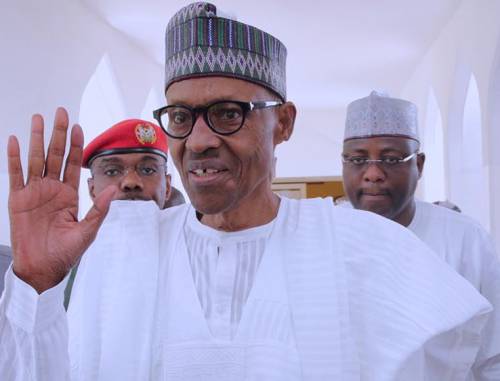The Dangerous Politics Of Buhari’s Health By Azu Ishiekwene


I don’t know if protocol will permit it. But it would not be a bad idea for British Prime Minister Theresa May to visit President Muhammadu Buhari at the London hospital where the Nigerian president is being treated.
She has a story to share.
Three years before May unexpectedly became prime minister, she got a surprise. Theresa May was not feeling well and after weeks of assuming it may well be part of the misery of politics, she decided to do a medical test.
She was misdiagnosed at first, with the result showing that she had Type 2 diabetes. It wasn’t Type 2 diabetes, but the result of the second test was even more difficult to believe: she had Type 1 diabetes. She received the news with shock, doubt and confusion.
Why was it difficult to believe? Type 1 diabetes, also described as “juvenile diabetes,” is common among much younger people (some say 40 and below), especially children. She was 57 and thought it improbable that she would have a medical condition associated with juveniles.
And, by the way, how did it “progress” from Type 2, a condition where the pancreas is unable to produce insulin, which regulates glucose levels in the blood, to Type 1, a rare form?
It wasn’t just the difference between Type 1 and Type 2 diabetes that bothered May. Her problem was twofold: the first was the debate about whether diabetes is a health problem or a non-threatening medical condition.
The second and main problem, which was to emerge three years after she unexpectedly became prime ministers, was the politics of her diabetes.
She had been Home Secretary for a while and had managed. But being prime minister was another thing altogether. Her critics insisted that diabetes was a health problem and that it would impair her performance.
How would she face the health-obsessed British public and tell them that after six years of David Cameron, who looked impressively fit, their new prime minister would be taking at least two shots of insulin every day and still be well enough to get the job done?
Some said she was criticized because she is a woman, insisting that these same critics had been milder with Tony Blair, who had a heart condition, or Gordon Brown, who is blind in his left eye.
But May had to face the situation for what it was. She had to come out. She takes her two shots of insulin everyday, does her exercises and watches her food like a mole. The British public is adjusting to the fact that diabetes is not a handicap.
Britain has learnt to live with May’s diabetes because she was honest with herself and with the public. From Andrew Jackson to Franklin Roosevelt and from François Mitterand to Félix Houphouët-Boigny, history is full of sovereigns who went the extra mile to hide their ailments or handicap from the public.
At 74 and in his second life at the nation’s top job, it is sad that President Muhammadu Buhari allowed reasonable disclosure of his health status to slip away from his hands.
Whether it is Crohn’s Disease as reported by SaharaReporters, prostate cancer, or whatever it is, any ailment that kept Buhari away in London for nearly six weeks before he was sworn-in after his election, and has kept him in hospital for 69 days out of his 712-day presidency, could hardly have been unknown to him before May 2015.
The danger of what now appears to be a malicious concealment of his health status is that politicians and a few around him who feel threatened will exploit it for personal advantage. And it’s happening already.
It’s ridiculous, for example, that the newspapers could not get the correct description of Vice President Yemi Osinbajo’s role in Buhari’s absence. A faction of the cabal, which obviously thought that expressly designating Osinbajo “acting President” the first time was a mistake, has opted for a muddle: coordinating vice president.
We don’t need to split hairs over that. Not designating Osinbajo as “acting,” means that Buhari is still fully capable of carrying out the duties of his office. He will receive any foreign heads of government that may be visiting at this time and receive the letters of credence of ambassadors from other countries, which he has not done since January.
Stephen Ocheni and Suleiman Hassan, the two new ministers recently confirmed by the Senate, have to wait for Buhari to swear them in. Osinbajo couldn’t do so on Wednesday because, under the circumstance, it would have been improper.
The report of the presidential committee that investigated allegations of corruption against Babachir Lawal, and the NIA Director-General Ayodele Oke, who gave safe haven to N13 billion orphaned cash will be left in the pending tray.
Ambassadors that have been cleared by the Senate will also join the line. And in a matter of days when the National Assembly transmits the 2017 budget, Buhari will assent it, flesh and blood.
Sure, these are small potatoes in the presidential menu. But when it is time to eat the frog, it would be ridiculous for those who appear to have taken matters out of Buhari’s hands to play the sort of hide-and-seek we saw under former President Umaru Yar’Adua.
The danger, at times like these, is that power floats, partly drifting but largely being usurped by a few self-appointed oracles, who would want the public to accept their every word as Buhari’s wish. That is unacceptable.
If the President is away on health grounds – which is just as well – and he is expected to perform his full official duties while away, then the government must disclose where he is and the public must see, in daylight, how he is performing his duties.
We are not going to wait for former President Olusegun Obasanjo and co to speak in selfish parables from their coven or allow politicians who are only motivated by their own insecurity and self-interest to corner us, as they have always done.
The government has to come out and tell us what the British already know about the President’s health, so that we can watch and pray with knowledge.
Sovereigns who were able to conceal, misrepresent or understate, their health status in the past did so before Twitter. Now, it’s all out there in 140 characters or less.
May, too, would have hidden her health status, if she could. But her courage, honesty and love of country compelled her to do otherwise. If she could visit Buhari, she might just tell him that this a fantastically conducive moment to level with the country he desperately loves.
Ishiekwene is the MD/Editor-In-Chief of The Interview magazine and board member of the Paris-based Global Editor’s Network.










